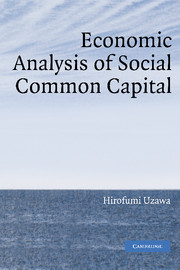Book contents
- Frontmatter
- Contents
- List of Figures
- Preface
- Introduction: Social Common Capital
- 1 Fisheries, Forestry, and Agriculture in the Theory of the Commons
- 2 The Prototype Model of Social Common Capital
- 3 Sustainability and Social Common Capital
- 4 A Commons Model of Social Common Capital
- 5 Energy and Recycling of Residual Wastes
- 6 Agriculture and Social Common Capital
- 7 Global Warming and Sustainable Development
- 8 Education as Social Common Capital
- 9 Medical Care as Social Common Capital
- Main Results Recapitulated
- References
- Index
5 - Energy and Recycling of Residual Wastes
Published online by Cambridge University Press: 18 December 2009
- Frontmatter
- Contents
- List of Figures
- Preface
- Introduction: Social Common Capital
- 1 Fisheries, Forestry, and Agriculture in the Theory of the Commons
- 2 The Prototype Model of Social Common Capital
- 3 Sustainability and Social Common Capital
- 4 A Commons Model of Social Common Capital
- 5 Energy and Recycling of Residual Wastes
- 6 Agriculture and Social Common Capital
- 7 Global Warming and Sustainable Development
- 8 Education as Social Common Capital
- 9 Medical Care as Social Common Capital
- Main Results Recapitulated
- References
- Index
Summary
INTRODUCTION
In this chapter, we formulate a model of social common capital in which the energy use and recycling of residual waste are explicitly taken into consideration and the optimal arrangements concerning the pricing of energy and recycling of residual wastes are examined within the framework of the prototype model of social common capital introduced in Chapter 2.
The disposal of residual wastes – industrial, urban, and otherwise – has become one of the more menacing problems faced by any contemporary society. In this chapter, we explore the possibility of converting the disposed stock of residual wastes to an “urban mine” from which precious metals and other materials are extracted to be used as raw materials for the industrial processes of production, particularly for the production of energy.
In the model of social common capital introduced in this chapter, we consider a particular type of social institution that is specialized in reprocessing disposed residual wastes and converting them to raw materials to be used as inputs for the production processes of energy-producing firms.
As in the case of the models of social common capital introduced in the previous chapters, all factors of production that are necessary for the professional provision of services of social common capital are either privately owned or are managed as though they are privately owned. As was discussed in detail in the Introduction, services of social common capital are subject to the phenomenon of congestion, resulting in the divergence between private and social costs.
- Type
- Chapter
- Information
- Economic Analysis of Social Common Capital , pp. 189 - 218Publisher: Cambridge University PressPrint publication year: 2005



